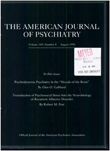Dyskinetic movements, cognitive impairment, and negative symptoms in elderly neuropsychiatric patients
Abstract
The presence or absence of tardive dyskinesia, cognitive status, and psychopathology were assessed in a group of elderly male psychiatric patients (N = 49) in a nursing home setting. Twenty-five patients were found to have tardive dyskinesia, which was associated with a greater degree of cognitive impairment and negative symptoms. This finding was not related to obvious macroscopic organic pathologies, which were less prevalent in the dyskinetic patients. In fact, patients with frontal lesions (primarily lobotomies) had a significantly lower prevalence of tardive dyskinesia.
Access content
To read the fulltext, please use one of the options below to sign in or purchase access.- Personal login
- Institutional Login
- Sign in via OpenAthens
- Register for access
-
Please login/register if you wish to pair your device and check access availability.
Not a subscriber?
PsychiatryOnline subscription options offer access to the DSM-5 library, books, journals, CME, and patient resources. This all-in-one virtual library provides psychiatrists and mental health professionals with key resources for diagnosis, treatment, research, and professional development.
Need more help? PsychiatryOnline Customer Service may be reached by emailing [email protected] or by calling 800-368-5777 (in the U.S.) or 703-907-7322 (outside the U.S.).



